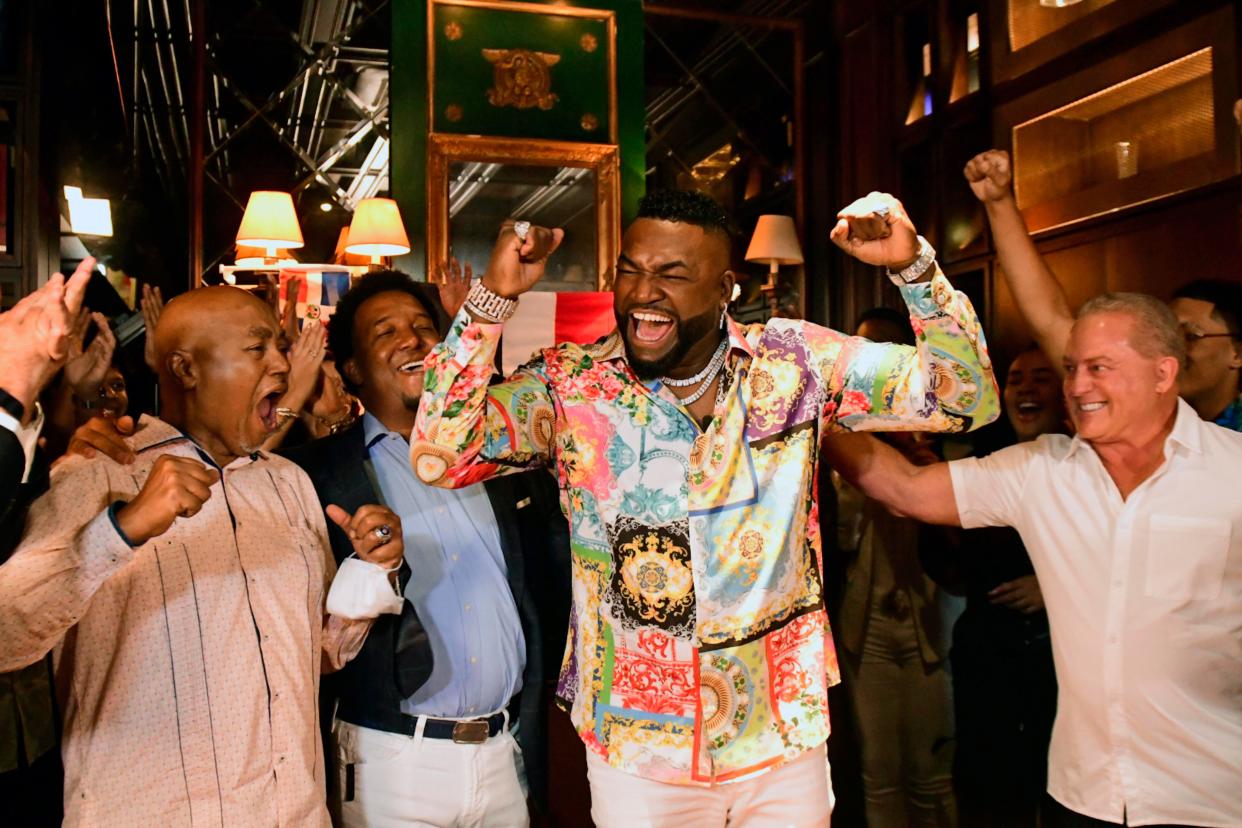Baseball Hall of Fame future intruiging with election of Ortiz, loss of Bonds-Clemens-Schilling

- Oops!Something went wrong.Please try again later.
- Oops!Something went wrong.Please try again later.
- Oops!Something went wrong.Please try again later.
- Oops!Something went wrong.Please try again later.
- Oops!Something went wrong.Please try again later.
- Oops!Something went wrong.Please try again later.
David Ortiz will join Jim Kaat in the Hall of Fame after one of the most fascinating baseball writers ballots yet to be seen.
Ortiz got 77.9% of the vote, just ahead of the 75% needed and will join Kaat, a Zeeland native who was voted in on the Golden Era Committee ballot in December, along with Gil Hodges, Minnie Minoso and Tony Oliva, plus Early Baseball Committee selections Buck O'Neil and Bud Fowler.
The group of seven makes for a large Hall of Fame Class of 2022, but it could have been much larger.
More: Jim Kaat reflects on 'life-changing' Hall of Fame call
More: BALLAD OF THE BALLOT: Decades-long wait for Jim Kaat, Tony Oliva finally over, now Hall of Famers
More: Jim Kaat, Tony Oliva overwhelmed to go into Hall of Fame together
Several players got more than 50% of the vote, including Barry Bonds, Roger Clemens, Scott Rolen, Curt Schilling, Todd Helton and Billy Wagner.
The addition of Ortiz is fascinating because he is the first candidate that has any actual ties (not just mentioned in the Mitchell Report) to performance-enhancing drugs to be elected to the Hall of Fame, though it is one of the weaker ties.
A 2009 story in The New York Times reported that Ortiz was among 104 players who tested positive for PEDs in 2003. Those results were supposed to remain confidential.
It never stated what exactly Ortiz tested positive for. He has denied that he used banned substances, and in 2016, MLB commissioner Rob Manfred said the tests in question were inconclusive because "it was hard to distinguish between certain substances that were legal, available over the counter and not banned under our program."
Manfred also said that during all MLB official testing Ortiz "has never been a positive at any point under our program."
So it makes it an extremely gray area that enough voters either gave him the benefit of the doubt or voted for him despite the report because of what he did on the field, including hit more than 500 home runs and become one of the most feared and dominating hitters in postseason history, leading the Boston Red Sox to reverse the Curse of the Bambino and claim multiple World Series titles.
So Ortiz is the door creaking open in regard to the players who have PED suspicions. Other players have been mentioned in reports like Ivan Rodriguez and Mike Piazza but had no actual evidence of any PED use.
This should have been good news for Barry Bonds, Roger Clemens Sammy Sosa, but it was not. This will not open the door for them in any way since it was their final year on the writers ballot. They will now head to the Today's Game Committee in the future, a committee that has seen Mark McGwire appear once on the list of 10 finalists, then not at all the next ballot.
The Hall of Fame has more control now over the process in the Era Committees, and smaller committees might have a more difficult time electing players suspected of PED use, with many current Hall of Famers so outspoken about it.
Meanwhile, there are other PED issues on the writers ballot. Alex Rodriguez, who was suspended after testing positive, received 34% in his first year on the ballot. Manny Ramirez, who tested positive twice, received 30%.
So while this could be an opening, the only player with any PED suspicions who did not actually test positive that remains on the ballot is 500 home run hitter Gary Sheffield, who received 40% as his case has actually gained a little momentum in the past couple of years.
Now, the ballot will look quite a bit different without Bonds, Clemens, Sosa and Curt Schilling, who fell off the ballot for reasons altogether different. Four players who clearly have the numbers and the fame for the Hall of Fame, but have major reasons voters didn't vote for them.
Perhaps they will be elected someday via the Today's Game Era, and they likely will. But the wait will be longer even with Big Papi's election.
But one thing is for sure. On next year's writers ballot, for the first time in a decade, the main focus of the vote won't be on Bonds, Clemens or Schilling.
It will be refreshing to talk about something else, like how underappreciated Scott Rolen and Andrew Jones were and if Carlos Beltran actually has a shot at making it first ballot in 2023.
Let the discussions begin.
— Contact Sports Editor Dan D'Addona at Dan.D'Addona@hollandsentinel.com. Follow him on Twitter @DanDAddona and Facebook @Holland Sentinel Sports.
This article originally appeared on The Holland Sentinel: Baseball Hall of Fame future intriguing with this year's selections

